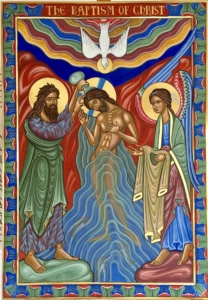Prayers and Sermon
January 12, 2025
Recording of Weekly Prayers:
Click here for the Prayers of the People.
Baptism?
The Reverend Mark Sutherland
Recording of the Sermon:
Baptism of Christ
12 January 2025
Evangelicals often view baptism as a personal act of faith—a believer’s conscious decision and a ticket to heaven. Anglicans, however, generally see baptism as a celebration of God’s grace, marking entry into a community where salvation is encountered and witnessed.
A contributor to Sermons.com shares a humorous story about three pastors lamenting their shared problem: bats in the belfry. The first pastor tried scaring them away by shooting at them, but all he succeeded in doing was making holes in the roof. The second pastor captured the bats, transported them 50 miles away, and released them, only to find they returned to the church before he did. The third pastor stunned his colleagues by announcing he no longer had a bat problem. When asked how he achieved this, he replied, “I baptized them—and I’ve never seen them again.”
This amusing anecdote illustrates the saying, “Many a true word is spoken in jest.” It raises a serious question: What is the meaning and purpose of baptism?
William Temple, a revered Archbishop of Canterbury in the mid-20th century, once observed, “The Church is the only society that exists for those who are not its members.” This sentiment sheds light on the Anglican tradition’s unconventional view of boundaries. Becoming a member of the Episcopal Church often feels effortless—attending regularly can subtly integrate you into the community before you even notice.
This approach is unusual among contemporary American churches. The Episcopal Church’s open boundaries express Temple’s assertion. However, this openness creates challenges in distinguishing the Church from the world. Worship is open to all, but only the baptized are invited to communion—though no one is turned away.
To Christians from other traditions, this may seem inconsistent. Yet, it reflects a theology that regards baptism as entry into a saving community, nourished by Holy Communion. It also acknowledges that the altar rail is not the place to turn away those who approach with faith and good conscience.
In Mark’s Gospel, Jesus’ baptism is profoundly personal—his adoption as God’s Son is a secret known only to him and John the Baptist. By contrast, Luke’s account portrays Jesus’ baptism as a communal event:
“Now when all the people were baptized, and when Jesus also had been baptized and was praying…”
Mark presents Jesus stepping onto the world stage, becoming the Son of God through adoption at baptism. Luke, however, emphasizes that Jesus has always been the Son of God, with his baptism confirming this preexisting truth.
These differences reflect an ongoing theological debate: Are we saved through baptism, or is baptism a recognition of salvation already granted?
Evangelicals often view baptism as a personal act of faith—a believer’s conscious decision and a ticket to heaven. Anglicans, however, generally see baptism as a celebration of God’s grace, marking entry into a community where salvation is encountered and witnessed.
Returning to Temple’s statement, “The Church is the only society that exists for those who are not its members,” we recognize the Church often falls short, behaving as though it exists solely for its own benefit.
Protestants view the Church as a temporary gathering, existing only when believers come together. In contrast, Anglicans and Catholics see the Church as the mystical body of Christ, existing beyond any specific gathering. Accordingly, Protestants see baptism as entry into an individual relationship with Christ, while Anglicans and Catholics view it as entry into the communal life of the Church—a saving experience.
For Roman Catholics, salvation is bound within the Church, necessitating rigorous boundaries. Anglicans, however, see the Church as leaven in the loaf of the world. The Episcopal Church exists not to confine God’s salvation but to witness to its presence already at work.
Why does this matter? For me, it challenges the Calvinist preoccupation with personal salvation. I reject the idea that my salvation depends on choosing Jesus while my neighbor faces damnation. God loves us both without distinction. The real question is: How do we live out this truth?
Baptism is not a one-time event but a daily commitment to live out God’s purpose in the world. In the Episcopal Church, this commitment is articulated in the Baptismal Covenant, which includes five promises:
1. Faithfulness in community: Participate in the life of the Church, practicing faith daily.
2. Resistance to evil: Fight evil and return to the path of repentance when you fall short.
3. Proclamation of the Gospel: Share the good news that God has already saved the world in Christ.
4. Service to others: Love and serve your neighbor as yourself.
5. Justice and dignity: Strive for justice, peace, and the dignity of every human being.
As Episcopalians, we embrace fuzzy boundaries intentionally. Guided by Temple’s vision, we affirm that belonging precedes believing.
Through baptism, we join a community that witnesses to God’s salvation as a gift for all. Christians live in tension—balancing engagement with the world’s values and dedication to a life of service and witness shaped by the Baptismal Covenant.

